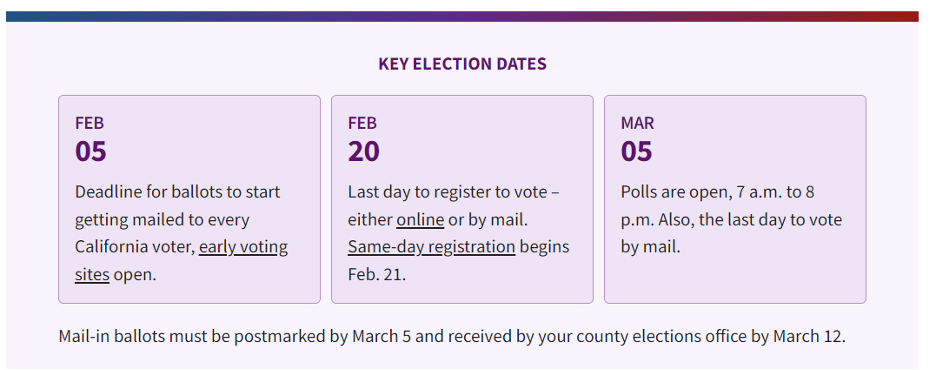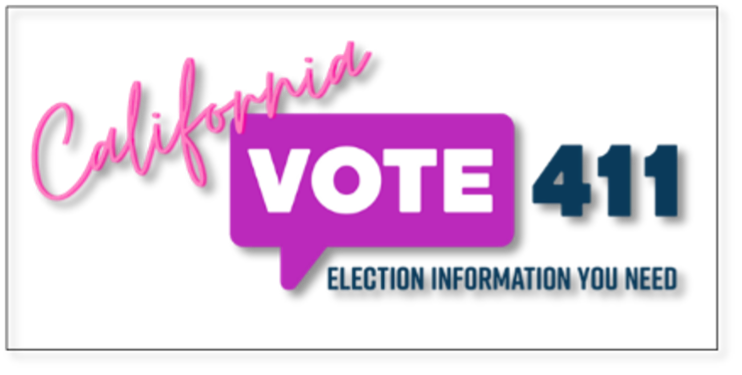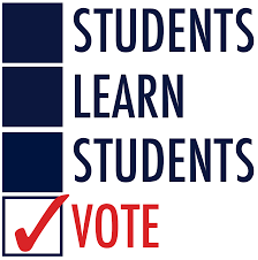 myCSUSM
myCSUSMFaculty Resources for Voter Education
Participation in elections by college-aged youth is increasing. By one estimate, 50 percent of young people ages 18 to 29 voted in the 2020 presidential election, an 11-point increase from 2016 (39 percent).
Still, the evidence suggests that young people vote at much lower rates than older Americans. Moreover, even among youth there are major inequities in turnout by race, education, rurality, and other factors that prevent us from having a truly representative electorate. In 2022, for example, the estimated voter turnout of Black (15%) and Latino (14%) youth was nearly 10 percentage points lower than that of youth overall. There was also a nearly 30-point gap between the voter turnout of youth with a Bachelor’s degree and those with a high school diploma but no college experience.
These systemic deficiencies in our democracy require equally structural shifts in how we prepare young people to participate in democracy.
Faculty are the most direct and consistent pathway to students for election information
Set aside time to discuss civic learning and democratic engagement in your classroom. When faculty connect elections and voting directly to policies that intersect with course content, it provides the additional “why” we vote.
Scholars Strategy Network Faculty Guide to Student Voting
- CSUSM Free Speech and Election Events
- Top 5 Reasons Students Should Vote
- It is a constitutional right and privilege that our founding fathers stood for.
- If you don’t vote for your own interests, who will?
- Young voters account for half of the voting population, making them a powerful political force. Young people need to vote to directly influence issues that might affect their lives for years to come.
- It is easier than ever to be an educated voter. Everything is at our finger tips! Check out the Election Resource page for sites to view to be an informed voter.
- Everyone has a voice and wants to be heard in one way or another, THIS IS YOUR VOICE, VOTE!
Read the full list of 10 Reasons Why It Is Important to Vote at the California Post.
- Facilitating Civil Discussions in Your Class
A New York Times collective lesson plan, Talking Across Divides: 10 Ways to Encourage Civil Classroom Conversations on Difficult Issues.
- Create classroom rules and structures that support respectful and generative discussion, online and off.
- Take the 'Speak Up for Civility' pledge from Teaching Tolerance.
- Read and discuss articles that explore the problem of a divided America.
- Consider commenting standards - and test what you learn via the Times Comment-Moderation Quiz.
- Practice empathy.
- Back up statements with evidence and sources.
- Listen better, and ask genuine questions that seek to help you understand rather than judge.
- Expand your 'filter bubble'.
- Consider why 'us and them' is so ingrained in who we are.
- Learn about and try to counter 'confirmation bias'.
The article continues to be updated, including a companion lesson plan published in January 2017, Civil Conversations Challenge.
- Media Misinformation and News Literacy Sites
Election Misinformation and Disinformation
- Facts matter: Is your news source trustworthy?
- Factcheck.org monitors the factual accuracy of what is said by major U.S. political commentators in the form of TV ads, debates, speeches, interviews and press releases.
- University of Virginia’s Center for Politics Youth Leadership Initiatives’ media literacy lesson plans and tips.
- Media Misinformation, Viral Deception and Fake News Lesson Plans
- Libraries at University of Wyoming Resource Page.
- How to Spot FakeNews Infographic
- Published by the International Federation of Library Associations Institutions.
- Fake News, Propaganda, and Bad Information: Learning to Critically Evaluate Media
Sources
- Cornell University Library Guide of short excerpts on how to evaluate fake news.
- Facts matter: Is your news source trustworthy?
- 60-Second Civics Podcast
- Center for Civic Education 60-Second Civics Podcast
- 60-Second Civics content is primarily derived from the Center's education for democracy curricula, including We the People: The Citizen and the Constitution, Project Citizen, Foundations of Democracy, and Elements of Democracy.
- Center for Civic Education 60-Second Civics Podcast
- Election Introductory Videos
- TED-Ed Animations on Election Season
- The Fight for the right to vote in the United States. [5 minutes]
- Why do Americans vote on Tuesdays? [3 minutes]
- Does your vote count? The Electoral College explained. [5 minutes]
- How is power divided in the United State government? [4 minutes]
- TED-Ed Animations on Election Season
- Media Literacy Videos
- Crash Course Presents Media Literacy
- This series takes you through the history of media and gives you the skills to be
more media savvy.
- The Dark(er) Side of Media: Propaganda and Misinformation [10 minutes]
- Media Skills: Navigating the Media Landscape [11 minutes]
- This series takes you through the history of media and gives you the skills to be
more media savvy.
- Crash Course Presents Media Literacy
- National Voter Engagement Dates and Events
- Thursday, September 17 | Constitution Day
- Celebrate your constitutional right to be civically engaged.
- Tuesday, September 22 | National Voter Registration Day
- Register to vote and challenge three friends to register or update their registration status (confirm you are registered in your current city).
- Monday, October 3 – Friday, October 9 | National Voter Education Week
- A week long campaign that will equip voters with the tools, information, and confidence they need to cast their ballots this fall.
- Saturday, October 24 | Vote Early Day
- Identify three friends and encourage them to vote early. Have them cast their ballot and post a pic with their “I Voted Sign”.
- Tuesday, November 3 | General Election Day
- Submit your mail-in-ballot or vote in-person at your local poll site.
- Thursday, September 17 | Constitution Day
- Students as Poll Workers
Typically, older Americans volunteer as Poll Workers. However, this year, because of COVID-19, older Americans are being asked not to volunteer as Poll Workers to protect their health.
This year, the Registrar of Voters is recruiting college students to be paid poll workers. This will be a seven day (full week commitment ). Therefore, if a students informs you that they are a poll worker be flexible, as they are participating in a civic duty.
Here is the timeline of activities of a paid poll worker.
- 2- days of mandatory training.
- 1-day of poll site set-up assistance.
- 4-days of serving at the poll for eight hour shifts.
- 4-day 2020 Election Poll dates, Saturday, October 31 to Tuesday, November 3.
- [May be required] 1-day poll-site closing assistance.
Learn more about the qualifications and duties of a Poll Worker on the San Diego Registrar of Voters Poll Worker page.
- Should Faculty Promote Their Political Affiliation in their Email?
No. The CSU Office of General Counsel has previously advised that campaign activity is not appropriate for CSU-provided email accounts for employees.
While personal communications that include an individual's political views are usually fine, including it in an email signature which will go out on emails conducting university business would likely be deemed an inappropriate campaign activity
- Campaign-Related Activities by Faculty in the Election Process
According to the American Council on Education, Colleges and universities should take care to ensure that the voting resources offered to their students are nonpartisan and that their communications with students are offered and received that way.
Campaign-Related Activities by Faculty and Staff American citizens have the prerogative and constitutional right to engage in partisan political activity. However, distinguishing between an individual faculty or staff member’s own permissible civic engagement from that which would be impermissibly representative of the institution (actually or perceptively) is critical.
Colleges and universities can encourage individually motivated participation in political and social action while also helping their community members understand and attend to this distinction. Guidelines that are widely known and easily accessible should underscore community members’ actions, and words should not imply that the institution embraces or is committed to any partisan political position or point of view.
- The following activities by Faculty and Staff are not encouraged:
- Endorsing, expressly or impliedly, a candidate for public office
- Wearing campaign buttons in the classroom or while remote teaching or having a home office background containing posters or political campaign materials
- Promoting political affiliation in email
The CSU Office of General Counsel has previously advised that campaign activity is not appropriate for CSU-provided email accounts for employees.
While personal communications that include an individual's political views are usually fine, including it in an email signature which will go out on emails conducting university business would likely be deemed an inappropriate campaign activity
External Voting Resources


VOTE411 is committed to ensuring voters have the information they need to successfully participate in every election. Whether it's local, state or federal, every election is important to ensuring our laws and policies reflect the values and beliefs of our communities. Sponsored by the League of Women Voters Education Fund. Spanish Language VOTE411

The Students Learn Students Vote (SLSV) Coalition is the national hub and largest nonpartisan network in the United States dedicated to increasing college student voter participation. We convene and connect partners, campuses, and students with each other and with resources and programming – all towards achieving our vision of ensuring every student has easy and equal access to participate in every election.
Additional resources for faculty curriculum inclusion can be found at the Faculty Center Website.
This page is being maintained by the Department of Civic Engagement. If you have questions about a specific resource or event, please contact Rochelle Smarr, rsmarr@csusm.edu.






